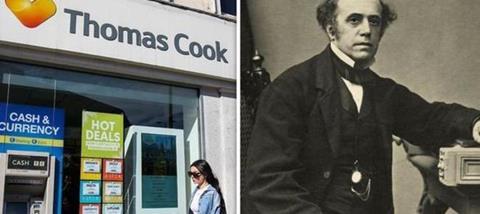
Thomas Cook organised and led the world's first genuinely commercial tourist excursion in August 1845. Now, 174 years later, the company he founded – one of the largest such businesses in existence – has collapsed under a mountain of debt and controversy.
In one respect Cook's ambition to provide affordable opportunities for travel to all was continued by the company he founded, but in other respects the contrasts between him and his successors today are stark.
The ideals that mainly motivated Cook were not commercial ones. They were encapsulated by the Gospel and the Temperance Movement. His commitment to Christ was first nurtured in the Sunday School of Melbourne Baptist Church in Derbyshire, where he was baptised as a believer. At the age of 19 he became an evangelist with the General Baptist Missionary Society (now part of BMS World Mission), walking from village to village in the Midlands preaching and distributing tracts.
Cook was passionate about combatting the dangers of alcoholic drink, campaigning vigorously on behalf of total abstinence. As Secretary of the South Midland Temperance Association he was a well known speaker and pamphleteer. As his business as a travel agent prospered, he built an imposing Temperance Hall and hotel in central Leicester, and used much of his growing wealth to support the poor, often the victims of alcohol misuse.
Temperance was the primary reason for Cook getting involved in the travel business in the first place. Impressed by the potential of the rapidly expanding railway network around 1840, he struck upon the idea of combining travel by rail with the cause of temperance. The very first excursion he organised was a summer excursion by train from Leicester to a park in Loughborough for a temperance gala. His extraordinary gifts of organisation came to the fore as he made arrangements with the Midland Counties Railway Company to transport 500 passengers and organised the event, complete with a wide variety of sports, a picnic and speeches for 3,000 people. Although the first genuinely commercial excursion came a few years later, it is usually on the date of this gala, 5 July 1841, that the modern travel industry said to have been born.
In all the many excursions Cook went on to organise at home and abroad, he wanted to bring people closer to God through what they experienced.
From the mid-1840s, Cook's programme of excursions grew increasingly ambitious. He advertised for customers and negotiated cheaper fares from the railway and steamer companies for the large groups he put together. He produced travel books and brochures, and delighted in introducing them to the beauty and variety of God's world in ways they could never have dreamed of doing otherwise.
Within a few years, many thousands were taking advantage of his expertise. Altogether 150,000 were helped to visit the 1851 Great Exhibition in London. Four years later he took parties across the channel to Germany and soon afterwards to Switzerland. In spite of criticism from those (mostly the upper classes) who found the prospect of large groups of tourists distasteful, he continued undaunted, adding North America and the Holy Land to his itinerary. In 1872 he embarked on his first round-the-world tour.
By the time of his death in 1892, Cook had established a global reputation and changed the lives of hundreds of thousands of people. His funeral at Archdeacon Road Baptist Church was attended by the Mayor of Leicester and city flags were flown at half-mast. Among those who paid tribute to him and his achievements was William Gladstone.
Wherever he went, particularly in India, Cook was keen to meet and encourage Christian missionaries. His Christian faith was never far from the surface, nor was his desire that the experiences gained by his customers would help break down barriers between people. His motivation was primarily social and spiritual, rather than commercial. Towards the end of his life, his relaxed attitude towards the profitability of his enterprises brought Cook into conflict with his son John, who was frustrated by some of his father's decisions, for example when he favoured his fellow Baptists with lower fares.
Cook's ability to build a large and successful business is unquestionable. His spiritual, moral and social ambitions created commercial problems for him from time to time, but perhaps in the long run, far from hindering his success, they actually contributed to his success. The collapse of his company now and the struggles of other businesses in our changing economic and commercial environment highlight the importance of the relationship between moral and economic goals. We hear that the Directors of Thomas Cook the company have benefited hugely from the company's operations, even while debt was mounting and the business was disintegrating about them. Stronger moral and social ideals, alongside commercial acumen, of the kind Cook would recognise, would probably have led to a different outcome.
Rev Dr Peter Shepherd is a retired Baptist minister and former President of the Baptist Historical Society. He was minister of Stoneygate Baptist Church in Leicester and researched the history of Baptists in Leicester, including Thomas Cook. For more information see his blog eucharistosblog.wordpress.com



























